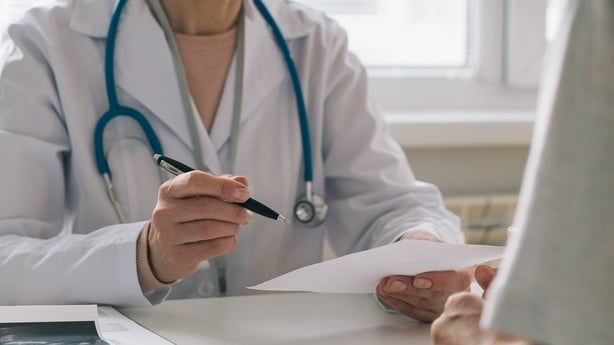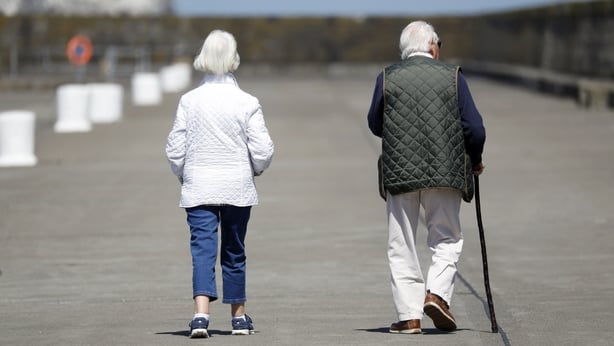Hospitals are stretched to their limits around the country, the Irish Nurses and Midwives Organisation has said, saying that it has never recorded this level of overcrowding at this time of year before.
The organisation said all hospitals, large and small, are struggling and staff are finding it difficult to deliver safe care.
The INMO wants public and private hospitals to act as one to relieve the pressure and prevent the situation getting worse.
Phil Ni Sheaghdha said "any emergency measure that is required must be taken immediately because if this gets worse it will be impossible to deal with in any safe way".
She said "normally we wouldn't see figures as high as today, 570 people sick enough to be admitted to hospital and not enough beds". Ms Ni Sheaghdha said traditionally you would not see it until early in the new year.
"We've never recorded figures like this, at this level of overcrowding."
We need your consent to load this rte-player contentWe use rte-player to manage extra content that can set cookies on your device and collect data about your activity. Please review their details and accept them to load the content.Manage Preferences
She said INMO members say people have no choice but to attend Emergency Departments because they cannot see their GP.
"We know this is going to get worse that's why we've called for all services to be available, public and private hospitals to work as one to relieve the pressure on the public facilities," she said.
The Health Service Executive has agreed to support GPs to run additional clinics during the current period of high pressure on the health system.

It follows talks between the HSE, supported by the Department of Health, and Irish Medical Organisation.
The Irish Medical Organisation said there is a significant surge in patient demand for GPs because of the prevalence of influenza, Covid and other respiratory illness.
In a letter to GPs, the HSE said the current "exceptional" pressure on them and acute hospitals is expected to last a number of weeks.
The measures include supports and grants to enable them to extend existing clinics or run additional clinics, although both the HSE and IMO say they recognise that not all practices will be in a position to do this.
The IMO said GPs may schedule extended or additional clinics on weekday evenings from 5pm to 7pm and between 9am and 1pm on Saturdays.
The organisation said there has been a significant surge in demand for GP care due to the prevalence of influenza, Covid-19 and other respiratory illness.
The latest figures from the Health Protection Surveillance Centre show there were 737 confirmed cases of Covid-19 in hospital as of 8am this morning, 35 of whom were in intensive care.
Read more:
Over 700 people in hospital with Covid-19, 32 in ICU
Call for mandatory masks on public transport
Latest coronavirus stories
'Worsening situations'
The President of the Irish Association for Emergency Medicine, Dr Fergal Hickey said the current pressure on emergency departments is "the latest in a series of worsening situations".
Speaking on RTÉ's Drivetime programme, Dr Hickey, who is also a former consultant at Sligo University Hospital said Ireland is entered the clinical winter of 2022/2023 with too few hospital beds and "the dogs on the street know that".
"Emergency departments have been under pressure for months on end and this is just the latest in a series of worsening situations," he said.
Dr Hickey added that Ireland has 2.8 acute hospital beds per thousand of the population, while the OECD average is 4.3.
He said that normally there is little or no elective actively in the week of Christmas so the high number of patients on trolleys in hospitals across the country is a reflection of the emergency workload.
Dr Hickey said he does not hold out much hope that additional GP hours or an overtime solution will make a difference.
"The people who end up on trolleys are the people who require hospital admission, so whether they come directly to the emergency department or are referred by a GP, if there isn't a bed for them, then they are going to end up in a situation where they are going to be on trolleys," he said.
He added than any additional capacity in primary care is welcome but it will not solve the bed capacity problem.
Dr Denis McCauley, chair of the IMO's GP sub-committee said he was "unsure" how many GPs will volunteer for the scheme, citing capacity issues.
"It isn't that general practice is quiet, that it can actually do this," he told RTÉ's Morning Ireland.
"We are very busy, we have our own capacity issues as well. There'll come a stage around 4pm or 5pm in the afternoon, where it's gotten so busy we can't extend our surgeries and see these patients."
Dr McCauley added that many GPs are at risk of burn-out after such a long period of intense demand on doctors.
He explained that Letterkenny University Hospital is under a 'code black' emergency "96% of the time", because the hospital has not got the capacity to deal with patients with flu and other winter viruses.
After the recent Strep A outbreak, he highlighted there may be a shortage of antibiotics.
"The worry about Strep A has made patients and parents more inclined to attend early, and as a result of that ... there is a relative shortage of antibiotics from time-to-time," he said.
'Crisis in GP workforce'
The Medical Director of the Irish College for General Practitioners (ICGP), Dr Diarmuid Quinlan, said there is a crisis in the general practice workforce.
Dr Quinlan said that while the HSE expansion of GP clinics is welcome, many GPs are already working to capacity.
Dr Quinlan said the ICGP published a document in October calling on the Government to set up a working group to look at solutions to the workforce and workload crisis in general practice.
"And we called on the minister to set up this working group, looking at the future of general practice as an urgent requirement, early in January 2023 so we can look at and implement the innovative solutions and also resource these solutions," he said.
On antibiotics, Dr Quinlan said that there is no cause for concern in terms of stocks in the country.
"I checked this this morning and we have an adequate stock of antibiotics in the country for the needs of our population," he said.
However, he said some pharmacies are experiencing distribution issues but he is "absolutely confident" that there is an adequate stock.
Monaghan based GP Dr Illona Duffy, Medical Director of North-East Doctor on Call, said most GPs do not have the capacity or the ability to extend surgery opening hours so she does not see too many GPs being able to undertake the extra work.
Speaking on RTÉ's Drivetime programme she said many GPs are frustrated because there is a sense that there will be an expectation that they will work longer hours.

Advice for older and vulnerable people
Meanwhile, Chief Nursing Officer at the Department of Health, Rachel Kenna issued advice for older and vulnerable people to help them stay well for the remainder of Christmas.
Speaking to RTÉ's News At One programme, Ms Kenna said: "It is really important to make sure that older people have social contact and that we check-in on older and vulnerable neighbours and relatives to make sure that they have things like medications, that they are staying warm and that they are OK and well."
Ms Keena said that older and vulnerable people should wear masks if people visit their homes and they should also ask visitors to wear masks.
She also said it is important to make sure vaccines and boosters are up to date.
"Ii is OK to not let people visit you in your home or your place of residence if they have any symptoms," Ms Kenna added.
"In fact we are advising anybody with symptoms to stay in their homes and not to circulate."
She said if people congregate they should make sure that it is a ventilated area and that people are wearing masks.
She said Covid, flu and Respiratory syncytial virus (RSV) are being seen in presentations to emergency departments.
"There is plenty you can do, stay well nourished, warm and most importantly stay active," Ms Kenna said.
Emergency departments are open and while they are under pressure, people can attend and receive the care they need, she added.
She also urged people to use other resources for care such as pharmacies, GP's "where we can" and minor injury units.

